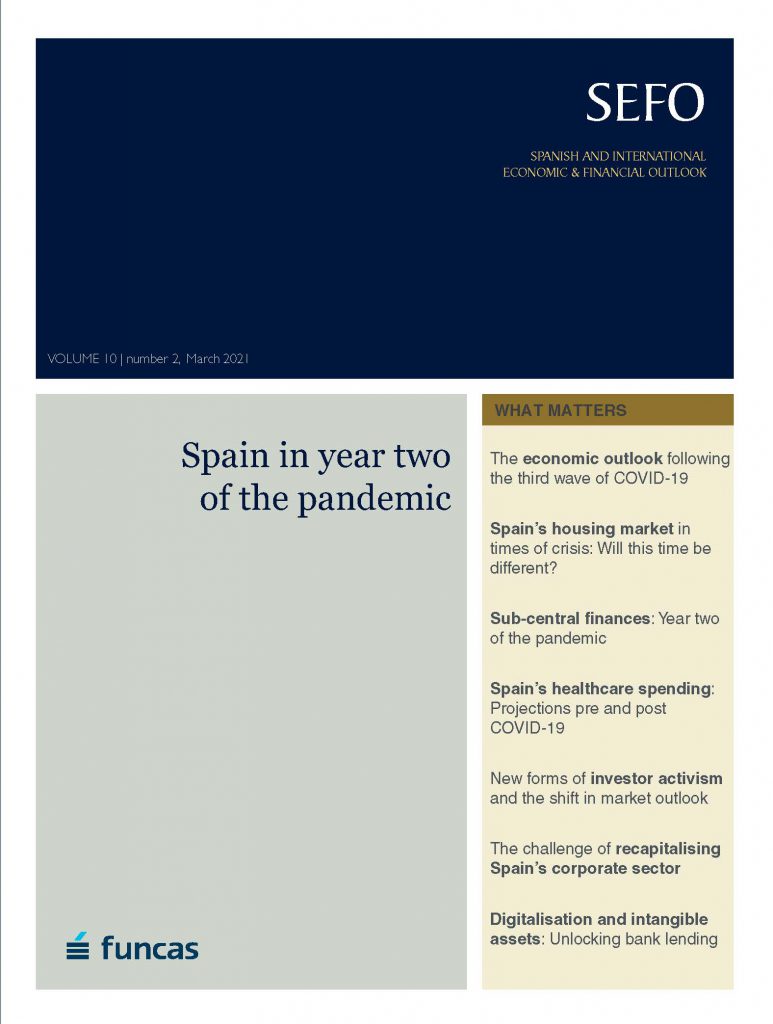Spain in year two of the pandemic
Fecha: March 2021
SEFO, Spanish and International Economic & Financial Outlook, V. 10 N.º 2 (March 2021)
Index
[expand title= "The economic outlook following the third wave of COVID-19"]Restrictions on mobility and businesses, as well as the slow progress on the vaccination front, will delay the recovery of the Spanish economy. The result is a cut in growth projections for 2021 by one percentage point, to 5.7%. Looking further ahead, the strength of the expansion will depend heavily on business insolvency rates and the extent to which tourism will be able to rebound.
[/expand] [expand title= "Spain’s housing market in times of crisis: Will this time be different?"]Unlike the previous financial crisis, the housing sector has proven to be resilient throughout most of the pandemic, with mortgages and housing transactions rebounding after an initial dip. Given that debt burdens are lower and housing affordability stronger than in previous years, the sector appears more likely to evolve than collapse.
[/expand] [expand title= "Sub-central finances: Year two of the pandemic"]While the Spanish central government’s debt and deficit increased significantly as a result of the pandemic, regional governments’ finances emerged in relatively better shape thanks to extraordinary support from the former. That said, there are notable differences across the regions both in terms of debt and deficit levels, which could make the transition back to normality a challenge.
[/expand] [expand title= "Spain’s healthcare spending: Projections pre and post COVID-19"]Analysis of healthcare spending patterns per capita by age and gender categories alongside demographic projections shows Spain’s healthcare spending will grow by over 10.83 billion euros between 2018 and 2030. While this increase in spending is necessary to bring Spain closer to international benchmarks, it will require an independent assessment to ensure the efficient allocation of funds.
[/expand] [expand title= "New forms of investor activism and the shift in market outlook"]The emergence of ‘populist activism’ best exemplified by the volatility in GameStop shares is distinct from previous forms of shareholder activism and entails risks for both institutional investment funds and retail investors. While Spanish regulators believe existing laws would render such activity illegal in Spain, other potential sources of volatility this year could still pose risks for financial markets participants.
[/expand] [expand title= "The challenge of recapitalising Spain’s corporate sector"]The intensity and duration of the COVID-19 crisis has raised the risk of a potential insolvency crisis in Spain’s corporate sector. In order to avoid this, targeted measures that utilise a variety of instruments, involve the role of the private sector, and reform bankruptcy procedures will be key.
[/expand] [expand title= "Digitalisation and intangible assets: Unlocking bank lending"]Spain’s lacklustre investment in intangible assets needs to be addressed if the country is to reap the productivity gains of the digital transformation. Initiatives such as the extension of government guarantees for loans used to invest in intangibles as well as the introduction of a supporting factor for banks’ RWA calculations could help increase bank lending to this category, which has lagged far behind other funding sources.
[/expand]
